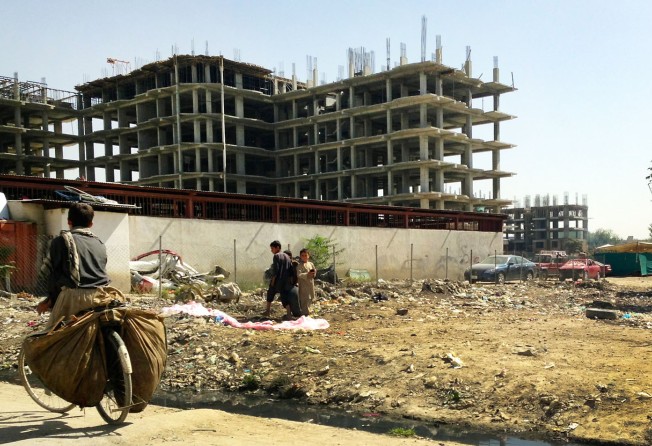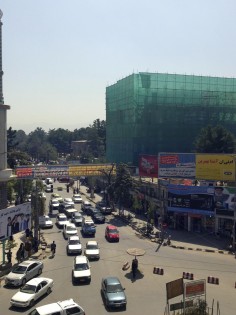
Subsidies prop up Kabul's property market as troops prepare to withdraw
Government hopes gated communities in Kabul where women can walk alone without Taliban berating them will keep civil servants from fleeing

Behind Kabul's airport a new city is taking shape: a gated community where apartments are fetching top dollar under a government plan to subsidise purchases and infuse the emerging middle-class with confidence in the future of their war-torn country.

Here, said resident Massoud Hossaini, "it is safe". In a city still at war amid escalating fears that the Taliban will win a role in government as President Hamid Karzai pursues peace, "people will spend a lot of money to buy in here because they are free".
On December 31, 2014, international combat troops will withdraw from Afghanistan after 13 years of war. Many foreigners and wealthy Afghans have left or plan to, further stemming the flow of cash that has propped up the economy and propelled Kabul property values to developed-world levels.
In the decade to 2012, around US$60 billion poured into Afghanistan, which ranks only above Somalia and North Korea on global corruption indices. With few other investment opportunities, Kabulis went on a property binge, building houses known as "poppy palaces" - mansions with bright tiles and Doric columns outside, and bowling alleys, cinemas, swimming pools, marble and chandeliers inside - and then renting them out for tens of thousands of US dollars a month.

In the past two years, however, property values have halved. "Now there is a kind of panic," Manalai said. The corollary is a fall in government revenues. "We expected last year that we would have 123 billion afghanis (HK$170.6 billion) in 2013. We are expecting now to reach about 107 billion to 108 billion afghanis, a significant drop largely due to the construction slowdown," he said.
The government has a "master plan" for Kabul, which includes satellite cities, a ring road, sewage, transport, irrigation, and traffic management. The scheme has a budget of US$25 billion for the next 15 years, with US$1 billion of it slated for residential property in the next three years alone.
Plans to upgrade the city for six million residents have cabinet approval, said Mohammad Akbar Ahmadi, deputy minister of urban development affairs. Some 40 per cent of the investment will come from the private sector and the rest from international donors and bilateral partners, such as the United Arab Emirates, Japan, the EU and the nation's urban development authorities.
A major component of the plan is the 1,500 square kilometre "New Kabul Project" 10 kilometres outside the city, Ahmadi said. The development is designed to house 1.5 million people.
Filling the breach between the burst bubble at the luxury end of the market and the dreams of urban planners, the middle classes are fuelling a boom in self-contained estates, now mushrooming on Kabul's outskirts.
In Aria City, east of downtown, about 10 per cent of the planned 350 blocks are complete. Buyers are so keen they are moving in before the lifts are installed. Guards check all who enter, though residents need not leave as Aria City has supermarkets, restaurants, gyms, car parks, beauty salons, pharmacies, gardens, playgrounds and schools.
"You see women and girls walking together with no men, families sitting in the gardens having picnics. You cannot live a normal life like this anywhere else in Kabul. If the mujahideen came and tried to tell people what to do, the prices would be very low," said Hossaini, a photographer in his thirties.
Outside the gates, Kabul is not safe. While Taliban attacks have dwindled this year, post-2014 uncertainty is fuelling worst-case fears of a repeat of the civil war of the 1990s, which left 80,000 people dead.
To boost public confidence, the government is helping civil servants buy apartments in developments such as Aria City, Ahmadi said, with grants of up to 40 per cent of the price. A Western banker in Kabul, speaking anonymously, said the subsidies aimed to keep the middle classes where they are most needed - at home.
"We are not worried about 2014, the troops leaving or a change in government," Ahmadi said. "These political issues will have a negative impact on Afghanistan's property market, but we have plans to halt the slide in property values, starting with 30 residential blocks that are being bought off-plan with government help.
"This is how we hope to halt the slide in property prices - by subsidising the private purchase of residential developments by 30 per cent to 40 per cent of the market value," he said.
"We are working with 200 construction companies and plan to provide houses [to government employees] at a 30 to 40 per cent discount on the market price, so the market adds 60 to 70 per cent to their profit."